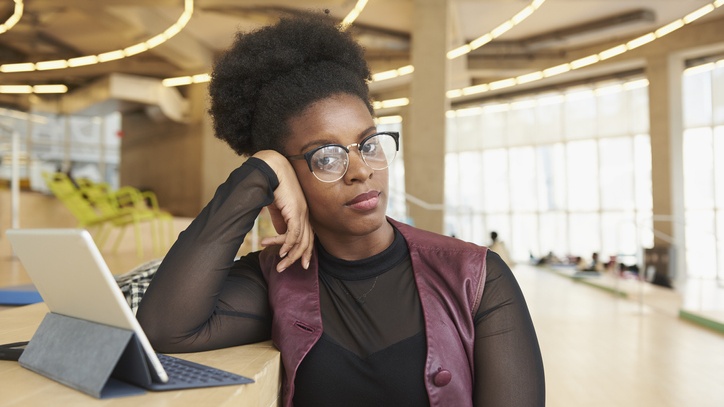Research conducted by Duke University’s Fuqua School of Business has revealed a societal bias against Black women who wear hairstyles like afros, braids, or curls in the workplace and that such attitudes contribute to racial discrimination.
Duke management professor Ashleigh Shelby Rosette noted in the research findings that the influence of Black hair may seem minuscule but that it is, in fact, a “serious consideration” and may lead to a lack of Black representation in corporate settings.
Rosette, a senior associate dean who led the research, said individuals’ biases often influence racist policies and discriminatory practices at organizations.
“In the aftermath of the George Floyd murder and the corresponding protests, many organizations have rightly focused on tactics to help eradicate racism at systemic and structural levels," she said. "But our individually held biases often precede the type of racist practices that become embedded and normalized within organizations.”
In order to discover biases held against Black women with natural hair, researchers convened a study where participants of varying races were asked to act as recruiters interviewing job applicants.
The participants in the study rated Black and white female job candidates on professionalism, competence and other factors. Black women with natural hairstyles were given lower scores on professionalism and were not recommended for the next stage of the mock screenings as often as white women with curly or straightened hair. The study also found Black women with natural hairstyles were deemed less competent than Black women with straightened hair.
In one experiment, two groups of mock evaluators rated the same Black woman as a job candidate. One group saw a photo of the applicant with natural hair, and the other group saw the woman with a straightened hairstyle. The photo of the woman with straight hair was rated as more professional, according to the study. The evaluators described the woman in that photo as more polished and refined. They were far more likely to recommend her for an interview.
“In many Western societies, whites have historically been the dominant social group and, as a result, the standard for professional appearance is often based on the physical appearance of whites. For women’s hair, that benchmark is having straightened hair,” Rosette said.
The study also found that the faux job candidates with natural hairstyles were subjected to discrimination when they were evaluated for jobs in consulting. However, mock evaluators hardly considered hair texture when screening profiles of women who desired to work at ad agencies. Rosette and the other researchers found this may be due to advertising being seen as a “creative industry” with a less dogmatic approach to workplace attire.
“Some organizations strip away biographical information such as a person’s name and other clues about gender or race from application materials. This procedure is known as blinding and has been shown to reduce similar types of bias as what we found in our research,” she said. “But there fundamentally has to be a level of awareness that the natural hair bias exists. If you don't know that it exists, you can’t know its influence on your decision-making processes.”
Similar research studies have found evidence that biases against Black natural hairstyles and textures are prevalent in our society, even among Black people.
In 2016, Perception Institution worked with the creative team at SheaMoisture to conduct the "Good Hair" study. The study included 4,163 participants with a sample of 688 Black and white "naturalista women." Researchers found one in five Black women feel pressure to straighten their hair for work, which was twice the number reported for white women. The study also discovered "millennial naturalistas" have far more positive views on textured hair than other women, including Black women with straightened hair.
In May 2019, the CROWN Coalition, short for “Creating a Respectful and Open World for Natural hair," released a report in which it found "biased behavior towards Black women's hairstyles in the workplace affects the perception of her 'job readiness.'" Natural hairstyles like braids, twists and bantu knots were rated the least favorably.
Discussions around hair discrimination have taken prominence in the public consciousness, but legislation is needed to help curb its effects.
As Blavity previously reported, employees at the New York City-based salon Sharon Dorram Color at Sally Hershberger filed complaints against the company for implementing bans on natural hairstyles. Days prior to a New York Times report that revealed the investigation, NYC officials announced a citywide ban on hair discrimination.
In one of the complaints made from 2016 to 2018, a white manager said he was forced to mandate a policy that only affected Black workers, according to The Times.
In January 2019, TV news reporter Brittany Noble Jones said she was fired after her bosses discovered she was pregnant and she embraced her natural hairstyle.
"I was told my natural hair is unprofessional and the equivalent to him throwing on a baseball cap to go to the grocery store. He said, 'Mississippi viewers needed to see a beauty queen.' He even asked, 'why my hair doesn't lay flat,'” Jones wrote on Medium.
Last month, the CROWN Act went into effect in Virginia and bans hair discrimination statewide. California State Sen. Holly J. Mitchell spearheaded the bill in her own state, which was signed into law in July 2019.
The entire report of the research will be published in the journal Social Psychological and Personality Science.
